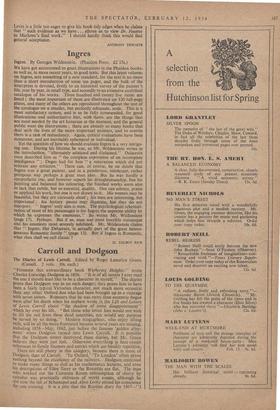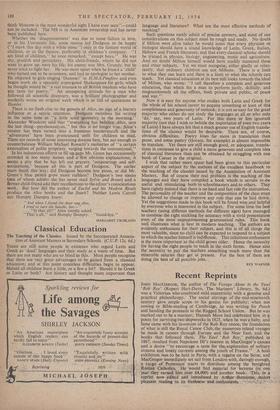The Diaries of Lewis Carroll. Edited by Roger Lancelyn Green.
• (Cassell. 2 vols. 30s. each.)
"FINISHED that extraordinary book Wuthering Heights:" wrote Charles Lutwidge Dodgson in 1856. "It is of all novels I ever read the one I should least like to be a character in myself." The diaries Prove that Dodgson was in no such danger; they prove him to have been a fairly typical Victorian character, not much more eccentric than any other Oxford don who had been brought up in a vicarage With seven sisters. Rumours that he was more than eccentric began soon after his death when his nephew wrote in the Life and Letters of Lewis Carroll about "the shadow of some disappointment" Which lay over his life. "But those who loved him would not wish to lift the veil from these dead sanctities, nor would any purpose be. served by so doing.", Modern biographers, who enjoy lifting yells, will be all the more frustrated because several years are missing, Including 1858—May, 1862, just before the famous 'golden after- noon' when Dodgson turned into Lewis CarrolL It is possible that the Dodgson sisters destroyed these diaries, but Mr. Green believes they were just lost. Otherwise everything is here except references to -family finances and entries which are bleakly repetitive. think Moscow is the most wonderful sight I have ever seen"—could not be included. The MS is in American ownership and has never been published here.
Whether the `disappointment' was due to some failure in love, or in his University life, some reason led Dodgson to be happy ("1 mark this day with a white stone") only in the fantasy world of children, or at the theatre, preferably in children's company. "I am fond of children," he once remarked, "except boys." He was shy, prudish and pernickety. His child-friends, whom he did not want to grow up, were his life; his enemy was Mrs. Grundy, but he never tried to fight her. He was most upset when he kissed a `child' who turned out to be seventeen, and had to apologise to her mother. He objected to girls singing `Danune!' in H.M.S.Pinafore and even began work (At a specially expurgated Shakespeare for girls, which he thought would be "a real treasure to all British maidens who have any taste for poetry." An uninspiring attitude for a man who followed all scientific discovery, was a brilliant photographer and modestly wrote an original work which is as full of quotations as Hamlet.
There is no fresh clue to the genesis of Alice, no sign of a literary influence or a satiric intention. Dodgson mentions his writing in the same tone as "a little solid geometry in the morning." Alexander Woolcott said that "everything has befallen Alice, save the last thing—psychoanalysis," but this is no longer true. Alice's creator has been turned into a frumious bandersnatch and the 'adventures' have been pronounced unfit for children to read. There are records of some interesting dreams here, but not enough to counterbalance William Michael Rossetti's memories of "a certain externalism of polite propriety, verging towards the conventional."
In his industrious efforts to fill up gaps Mr. Green has occasionally crowded in too many names and a few obvious explanations; it seems a pity that he has left out prayers, 'outpourings and self- accusations,' because all this is part of Dodgson. The earlier years finish this way; did Dodgson become less pious, or did Mr. Green's blue pencil grow more ruthless? Dodgson's two nieces (one of whom admits she has never read Sylvie and Bruno) and a former child-friend add their recollections to the editor's conscientious work. But how did the author of Euclid and his Modern Rivals produce the Alice books and the Snark? Neither Lewis Carroll nor Humpty Dumpty knew:
"And when I found the door was shut, I tried so turn the handle, but—"
. . . "Is that all?" Alice timidly asked.
"That's all," said Humpty Dumpty. "Good-bye."
MARGARET CROSLAND



































 Previous page
Previous page